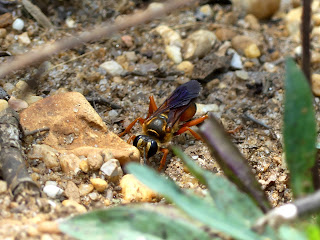Great Golden Digger Wasps
On my July trip to the Plainsboro Preserve, I found a great degree of gold. Or more specifically, I found Great Golden Digger Wasps. (I've talked about these wasps before.)
Many people are down on wasps, and certainly some of them can be aggressive stingers of people. But many wasps are mellower than that, rarely sting people, and can be beneficial to farms/gardens. The Great Golden Digger Wasp is one of these.
The main goal of the females is to dig holes in loose soil to provide nests for her offspring, and I wouldn't be at all surprised if that's what the wasp in the first picture is about to do. She'll dig a mail hole down about half a foot, and then dig 5-6 nest holes within it. If all goes according to plan, she'll fill each nest hole with an insect (grasshoppers, katydids, or crickets) that she's paralyzed with her sting, and then she'll lay an egg on each of those insects. Once that's done, she'll cover up the hole, and (maybe after a very short retirement), she'll die. Once her eggs hatch, they'll begin to devour the insects she left for them to eat.
Admittedly a single Great Golden Digger Wasp isn't likely to save a garden overrun by grasshoppers, but they do move the needle in the right direction.
 |
| July 23, 2021 at the Plainsboro Preserve Photo 148592828, (c) jpviolette, some rights reserved (CC BY-NC) |
In the next picture you'll see a Great Golden Digger Wasp providing another garden benefit: pollination. Digging holes, stinging grasshoppers, and dragging them back to the nest is hard work, and sugary nectar is the energy drink of choice for these wasps. And while they're slurping up nectar, they (much like butterflies/moths) will inadvertently move pollen from one flower to the next, helping the flower reproduce.
 |
| July 23, 2021 at the Plainsboro Preserve Photo 148593479, (c) jpviolette, some rights reserved (CC BY-NC) |
I don't expect you to be best friends with Yellow Jackets, but it's worth remembering that at least some wasps are as good neighbors as our honeybee and bumblebee friends.



Comments
Post a Comment